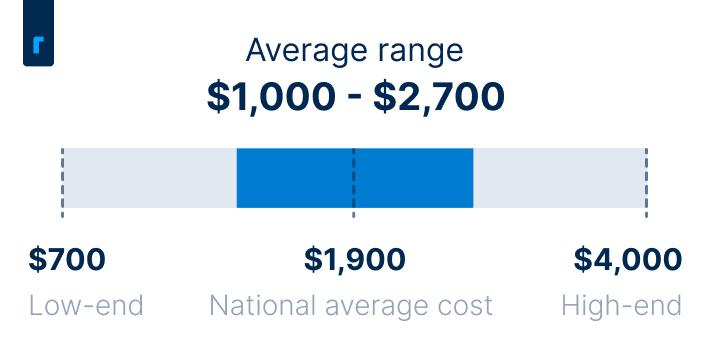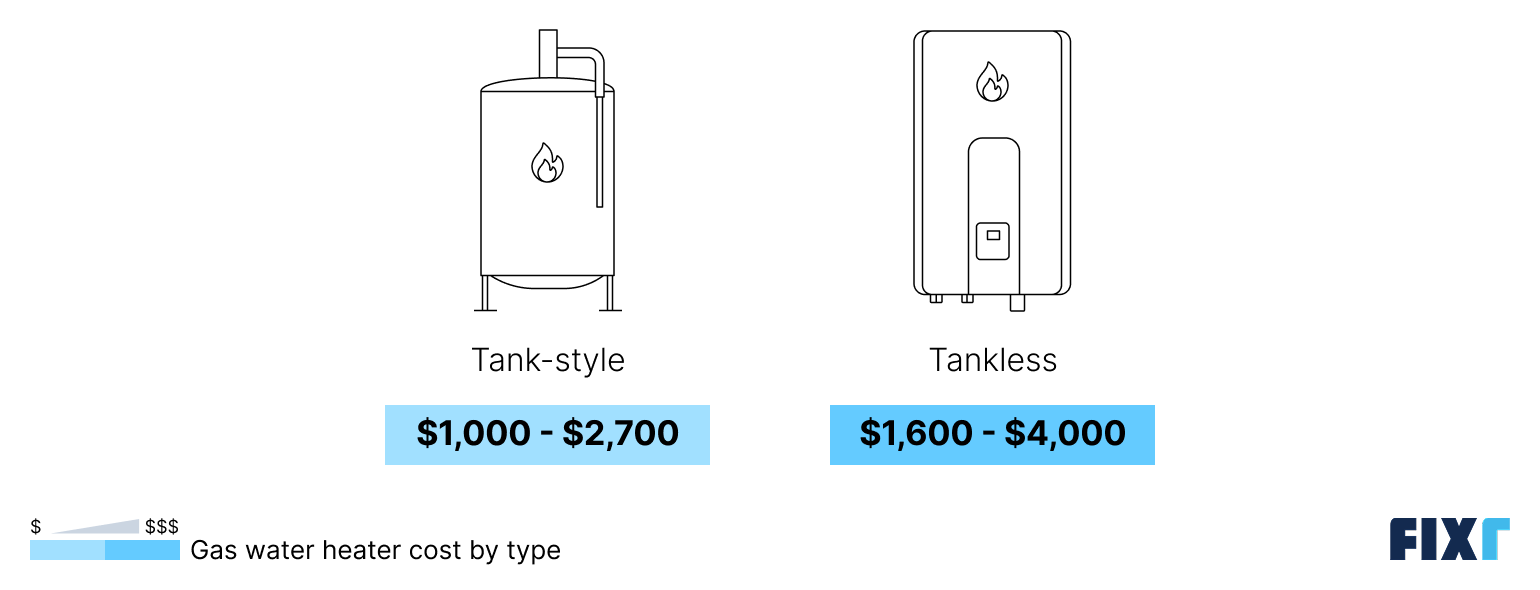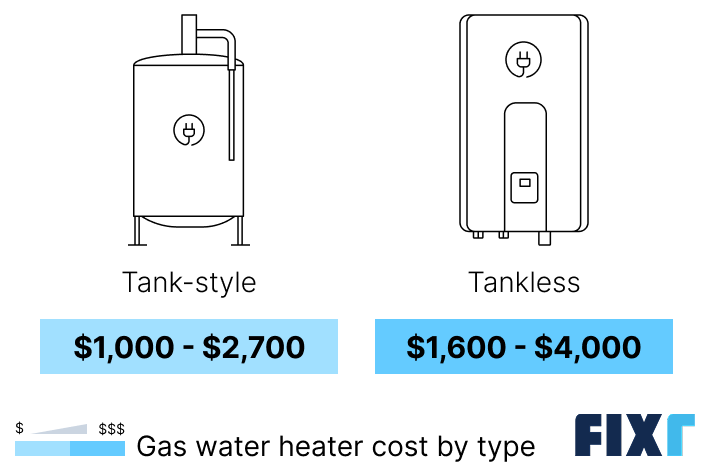Updated: January 30, 2026
Written by Dan Simms
Laura Madrigal is the Home Design Specialist at Fixr.com, dedicated to identifying and analyzing significant changes within residential design. She is the author of leading trends reports on interior design, kitchen, and bathroom, and her insights have been featured in publications like Realtor and the New York Post.
Learn moreReviewed by Laura Madrigal
The average cost to replace a gas water heater is $1,900, and most homeowners pay between $1,000 and $2,700. This cost is for a tank-style water heater, which is the most common option. Costs rise if you switch fuel types, upgrade to tankless, or need plumbing, venting, or gas line modifications. Tank size, household demand, and local labor rates also influence the final price.
Having access to hot water is a necessity for safety and comfort, so while you may not think about it often, your water heater is a crucial part of your home’s plumbing system. It works tirelessly to provide hot water for washing dishes and laundry and for comfortable bathing, so it’s a staple of daily life.
Gas Water Heater Replacement Cost


Cost to Install a Gas Water Heater by Type
The biggest factor affecting your gas hot water heater costs is the type of water heater you want to install.
Tank-style gas water heater: This is the most common type of gas water heater, and it’s the more affordable one. It heats water and stores the hot water in a tank so that it’s always ready for use. It’s possible to run out of hot water with heavy use, though.
Tankless gas water heater: Tankless models are more modern options that heat water on demand. As long as your unit is sized for your property, you’ll never run out of hot water. They’re also far more efficient since you never heat water you aren’t using, but natural gas tankless water heater installation costs close to twice as much as tank-style units.


Type of Water Heater | Cost Range |
Tank-style | $1,000 – $2,700 |
Tankless | $1,600 – $4,000 |
Gas Water Heater Installation Cost by Size
Tank-style water heaters come in sizes ranging from 30 to 80 gallons, in most cases, and tankless water heaters come in capacities measured in gallons per minute (GPM), usually ranging from 1 to 12.
You can use the estimates below for tank-style water heaters to get an idea of where your total will fall. For tankless water heaters, you should always have a professional size your system based on your peak and average hot water demands.
Capacity (Gallons) | Suitable For | Cost |
30 | 1 – 2 people | $700 – $2,100 |
40 | 1 – 4 people | $700 – $2,300 |
50 | 3 – 5 people | $900 – $2,500 |
75 | 4 – 6 people | $1,100 – $3,500 |
80 | 6+ people | $1,300 – $4,000 |
Labor Cost to Install a Gas Water Heater
Labor costs to replace a gas water heater account for around 20% to 25% of your total for a tank-style water heater, which means an average of between $200 and $650. Tankless installations are more labor-intensive due to wall mounting and utility line modifications, pushing labor closer to 50% of the total, or $800 to $2,000.
Some plumbers will charge an hourly rate, in which case you can expect to pay between $45 and $200 per hour.
Labor costs always include installing the new unit and connecting the gas and water lines. They’ll usually include removing your old water heater and hauling it away, but some contractors will add a charge for this service. Disposal fees may add $100 to $500, depending on unit size and contractor policy.
Additional Cost Factors
Beyond unit type, size, and labor, several secondary factors can affect installation costs:
Location in the home: Installation in a cramped crawl space will usually be more expensive than installing in a spacious utility closet on the first floor.
Geographic area: Labor costs scale with the local cost of living, so installation totals will vary based on where you live.
Venting and code requirements: Gas water heaters must be properly vented to prevent carbon monoxide buildup. If your venting needs replacement, expect costs between $500 and $1,100, closer to $500 for direct vents and nearer to $1,100 for power vents.
Brand: Brands like Kenmore and Whirlpool usually cost less than units made by Rheem and A.O. Smith.
Permits: Most municipalities require permits for plumbing and gas line work. A simple permit typically ranges from $25 to $300, but if installation involves running a new gas line or making major plumbing changes, permit and inspection costs can reach $1,500 or more.
Switching fuel types: If you are converting from an electric or oil water heater to a gas unit, your labor costs will be significantly higher due to the need for new gas lines and plumbing work, which can add up to $3,500 or more.
Fuel type: Propane water heaters cost about the same as natural gas water heaters, but they generally cost more to run.
DIY vs. Hiring a Professional
In some cases, it’s possible to DIY your water heater replacement, but it’s never a good idea, especially when it comes to gas water heaters. Installing a water heater involves working with electrical connections, water lines, gas lines, and ventilation ducts. Mistakes can be dangerous and even deadly, so the money you’ll save on labor is never worth it.
Additionally, without an expert to assess your needs and size your unit appropriately, you could end up with an undersized or oversized unit, which can lead to a lack of hot water or unnecessarily high utility bills.
Signs Your Gas Water Heater Needs Replacement
The cost to replace a gas water heater can get expensive, so one of the first things you should do is assess whether you need a replacement at all. Here are some signs you may need to replace your water heater:
You no longer get the hot water you need: This could be a sign of an undersized tankless unit or a tank-style water heater that has lost some efficiency.
You know your unit is nearing the end of its expected life: Tank-style water heaters last for 8 to 12 years, and tankless water heaters can last for 10 to 20 years.
Your water consistently has discoloration: Over time, soft water can degrade your water heater’s internal components and lead to rusting, which can discolor your water.
Your water heater makes unusual noises during operation: Hard water can leave calcium and magnesium deposits in your water heater. If these build up over time, they can reduce your system’s efficiency and start making clinking noises during operation.
You’ve had issues with leaks: A leaking water heater can suggest a cracked water tank or other broken internal components, which means repairs likely aren’t possible.
You have unusually high energy bills: Aging or damaged water heaters will consume more energy to provide the required output, so spikes in gas bills or electric bills can suggest that it’s time to replace your unit.
Repairs are usually worthwhile if the unit has at least half its lifespan remaining and repair costs are under 50% of replacement. Repeated issues often signal it’s time to replace.
Gas Water Heater Monthly Cost
The average U.S. resident spends $266 per month on utilities, and according to the U.S. Department of Energy, about 18% of the total utility cost goes toward heating water. That means running your water heater will cost an average of $47.88 per month, or $574.56 per year.
Your fuel costs are expected to be higher for propane, as the delivery costs and the fuel itself are both more expensive. Natural gas water heaters are the most efficient and also the most affordable to run long-term, providing significant energy savings.
Gas vs. Electric Water Heater Monthly Cost
While natural gas is inexpensive, it’s also a fossil fuel, and burning even the most energy-efficient fossil fuels produces carbon dioxide and isn’t environmentally friendly. Burning natural gas also generates dangerous and potentially deadly carbon monoxide. Because of these factors, some homeowners consider switching to electric water heaters.
Electric water heaters are more expensive to run, costing around 30% to operate. That means an average running cost of just over $60 per month for an electric water heater versus $47 for natural gas.
How to Choose a Gas Water Heater
There are countless gas water heaters to choose from, with different brands, storage capacities, GPM ratings, upfront costs, and efficiency levels all complicating the decision. Here are a few key things to prioritize when deciding which unit is a good fit for your home:
Capacity based on demand: It’s best to have your professional determine your ideal water heater size, but be sure to consider the following:
First hour rating (FHR) for tank-style: Tank-style water heaters need to have an FHR that matches or exceeds the gallons of hot water you’ll need in a given hour during peak hot water consumption.
Gallons per minute (GPM) for tankless: Tankless units need to meet or exceed the output in gallons per minute you’ll use during peak hot water consumption.
Energy efficiency: Water heaters with a higher efficiency rating will use less energy to provide a similar result, leading to lower running costs over time. Look for ENERGY STAR-certified products, and pay attention to Energy Factor (EF) and Uniform Energy Factor (UEF) ratings.
Smart features: These include adaptive heating to provide maximum comfort at lower costs, smart leak detection, automatic shut-off for safety, remote monitoring, and even vacation or eco modes.
Local climate and groundwater temperature: Consider the climate in your area and how the groundwater temperature can influence your hot water needs. In extremely cold climates, your pro may suggest upsizing your water heater to ensure your unit meets demands, and you may be able to get away with a smaller-than-average unit in hotter climates.
Gas Water Heater Maintenance
Routine maintenance extends lifespan and preserves efficiency:
Flush tank-style units annually (twice yearly in hard water areas).
Inspect and replace anode rods every 2–3 years.
Replace tankless filters every six months.
Keep the temperature set between 120°F and 140°F.
Check the pilot light color annually.
Schedule professional tune-ups every 2 to 3 years.
FAQs
A tank-style gas water heater will last for 8 to 12 years, on average, while a gas tankless water heater costs more but will last for 10 to 20 years. The lifespan will vary based on usage, water quality, and maintenance.
A tank-style water heater has a large reservoir, usually between 30 and 80 gallons, that holds hot water and maintains the temperature so that it’s ready for use. A tankless water heater heats water on demand, so you only ever pay to heat the water you’re actually using. Tank-style water heaters have no delay for hot water and are more affordable, but tankless water heaters are more efficient, and properly sized units will provide endless hot water for your home.
It takes two to three hours, on average, for a professional to install a gas tank-style water heater, provided you already have the gas and water connections necessary. Installing a tankless water heater requires more work to route utility lines to the new unit, so expect the installation to take between four and six hours.
Many modern gas water heaters need electricity, especially if they use an electric ignition rather than a pilot light, if they rely on powered ventilation, if they have smart features, or if they feature a control panel.
Electric water heaters are more environmentally friendly, especially if you power them with solar or geothermal energy. They are also safer, with no risk of carbon monoxide production, and they’re more energy-efficient. Gas water heaters have a much higher output of heat, though, so they’re more reliable in colder climates, and the higher output makes whole-home tankless systems possible, which isn’t realistic for electric water heaters in most cases.
